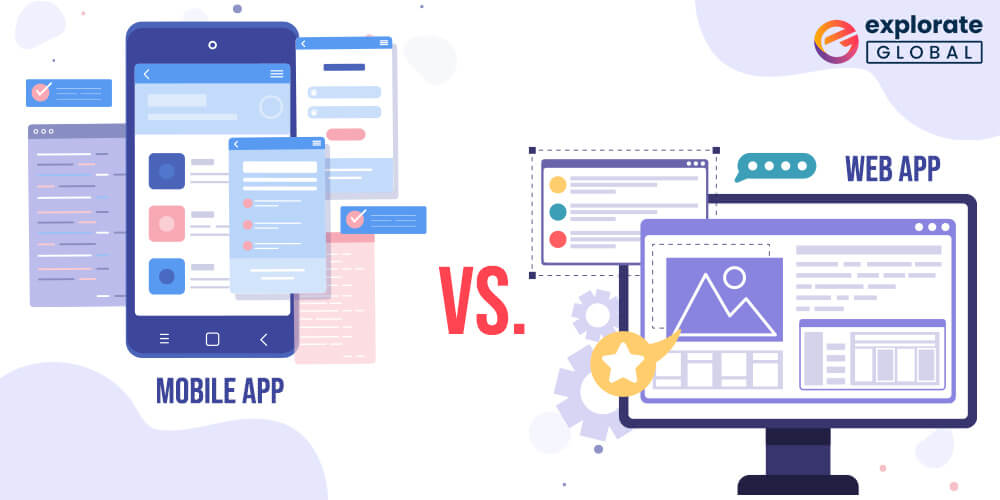
People are now using their mobile phones more than ever to access any information or data. Therefore, if your business is not accessible on the mobile platform, you lag behind your competitors. However, reaching your users on a mobile channel is not as easy as it appears. Therefore, a proper marketing strategy is needed to determine the best approach to allow users to connect you through mobile devices. The best method to achieve this is through an app.
When it comes to developing and deploying applications, there are two different approaches that you can use – Mobile apps Vs Web apps. So now you must be wondering about the Mobile apps Vs Web apps differences? While it looks like these two are similar, but in reality, they are entirely different, especially when it comes to technologies and the capabilities they offer.
Understanding their differences is crucial in building an effective digital product. Before investing in your app development, you’ll need to decide which type of app will best suit your budget, business requirements, and goals.
Therefore, the question is, should you invest in developing a mobile app or focus on creating a fully mobile-responsive web app? It is the typical Mobile app Vs. Web app debate. Before digging further, let’s understand what mobile apps and web apps are.
What is a Mobile App?
Mobile Apps are a part of our daily routine. Any application that can run on a handheld or mobile device (like a smartphone or tablet) to provide a service to its users is mobile apps. iOS and Android development are most commonly used in the Mobile App domain, followed by Microsoft.
Most organizations focus first on mobile application development for iOS and Android and then target the remaining platforms. Because there is a wide user base for iOS and Android in the global market, both cover 22.87% and 75.85% respectively.
Mobile Apps are mainly of two types – Native and Hybrid mobile apps.
Native Mobile Apps
Mobile apps using the platform-specific SDK for a targeted platform are classified as Native Mobile Apps. Primarily it is targeted towards Android development (using Android framework) or iOS development (using XCode or Swift). In Native mobile apps, compatibility and performance with the essential hardware are the main focus.
Hybrid Mobile Application
Hybrid Mobile apps will provide you with code compatible with all available operating systems. Due to a single code-base, Hybrid Mobile apps are more popular among Startups and Small & Medium Enterprises for having their apps created in a single go. The most popular Hybrid app development platforms are – React Native, Flutter, and Ionic.
What is a Web App?
Web Application is an autonomous software that runs on the web browser. The web application does not need to be downloaded and installed on the end user’s local machine. In addition, web applications can span over several pages or be limited to a single page.
The benefit of developing a web app is that it can be used across web browsers regardless of the underlying platform. They do not need to be custom-built for a platform or hardware. Therefore, it decreases the development efforts required in contradiction of writing code that must be transferred over multiple platforms.
The Office 365 from Microsoft and GSuite from Google are some well-known examples of web applications that we use regularly.
A Web App Would Be Right For You If
-
- The Webpage layout offers a better interface for your app.
- Your target audience market prefers using browsers instead of mobile.
- You want to apply dynamic updates to the whole application.
Some Special Cases When You Should Not Choose A Web App:
-
- When you have to communicate with the server, even in offline mode.
- The application involves multiple functionalities and interfaces.
Mobile apps Vs Web apps – A Detailed Comparison
Now we are familiar with what mobile and web apps are, let’s get into the Mobile apps Vs Web apps differences based on the following factors:
Mobile apps Vs Web apps – Development
Differentiating mobile apps Vs Web apps in terms of design and functionality. Mobile apps are quicker and more advanced to implement, while on the other hand, web apps are generally faster and easier to create. Let’s find out some major differences between mobile and web app development.
The first step of developing web apps is the architecture, how the database is established, and how data flows between the app and the database. A Database Management System (DBMS) offers reliable APIs to build, update, and delete data based on user requests.
In addition, DBMS permits you to read and write data with secure access by providing leveled access to different parts and functions. The most frequently used database technology for web apps is SQL like MySQL or Document Database like MongoDB.
Next, when building the frontend. The visual component of the web app is essential to achieve a great user experience. Therefore, the frontend is generally developed with CSS, HTML, and JavaScript. In comparison, mobile apps are controlled by the characteristics of mobile devices. The benefit of that is that mobile apps can use native elements such as camera, GPS, accelerometer, fingerprint, face recognition, etc.
On the other hand, web app developers have to be aware of a wide range of screen sizes, configurations, and hardware specifications due to intense competition in the mobile industry and transformations within each platform.
Thanks to cross-platform development, mobile apps can be built in the same technologies as web apps that still run native code (Objective-C, Java, etc.). Therefore they can operate on different mobile operating systems like iOS and Android.
Mobile apps Vs Web apps – Connectivity and Speed
What is the first thing that comes to mind about a great experience using web or mobile apps? It is connectivity and speed. Nothing is more frustrating when suddenly a connection gets lost due to poor WiFi connectivity or lack of signal while using your favorite app. Fortunately, there is a solution to use your apps even without an internet connection.
There are mobile applications that allow us to access it anytime and almost anywhere. However, connectivity goes hand in hand with operation speed, and mobile apps generally operate 1.5 times faster than web apps. Due to their functionality being incorporated into the devices’ features and storing data locally on the device.
On the other hand, web apps work slower than mobile apps because they require a web server to manage requests from a client. In addition, they need an application server to perform the necessary tasks and a database to collect information. Moreover, web apps cannot work without an internet connection since they are being read from a browser, which can be the difference between a good and a bad user experience if there is poor connectivity.
Mobile apps Vs Web apps – Security
No one on the internet is safe from cybersecurity risks. Therefore, the highest security standards must be essential for any web or mobile application to avoid disastrous security failures. Adequate security measures should be implemented right from the start of the mobile application development process.
Suppose your web or mobile application is not tested or authenticated against security threats in the initial stages of development. Then, it can ruin valuable corporate data and resources from malicious attacks. So, what about your mobile and web apps? Are they secure enough?
Since mobile apps must be downloaded from an app store, it ensures that an app has been through Google’s or Apple’s screening and is safe and compatible with a device. However, for developers, the procedure of getting a mobile app approved by an app store can be lengthy and sometimes not successful.
Conversely, web applications are loaded from the Internet browser, which is not a guarantee of security. Therefore, users don’t have to download a web app to their devices and worry about its updates. Additionally, web apps can be familiar and responsive to any device. So operating a web app from your mobile device doesn’t appear pixelated or low quality if the website is optimized for mobile and is mobile-friendly.
Mobile apps Vs Web apps – Cost

According to Gartner, global spending on technology was $4 trillion in 2019. The fastest growth rate has occurred in the costs of enterprise software, IT consulting, and data centers. For example, a poorly managed computer can cost up to $5000 per year. In addition, all the interconnected networks (servers, routers, printers, etc.) can cost $8500 per PC annually. But rest assured, you can always find a solution if you know of things that can keep development costs down.
Mobile app development is quite expensive. Depending on the features and the functionalities, you should anticipate a starting price somewhere around $10000. Therefore, in the beginning, you should recognize what type of app you want to develop because if you start adding features that will change anyway, the cost of an app will increase.
In addition, the maintenance costs are also high, where a crucial factor is which platform you choose to develop. For example, when you create a mobile app for each platform, like Android, iPhone, BlackBerry, etc., maintenance costs will rely on further updates and fixes because you will have to do it individually. So, again, cross-platform development is a help that can lower costs.
On the other hand, web application development is cheaper. The basic web app cost can start at $3000, and again it entirely depends on project complexity. The list of factors can be different and not comprehensive since every project is exclusive. Usually, the cost of maintaining a web application is around 15-20% of the original development costs.
Conclusion
Every digital solution has its pros and cons. To make the best decision, make sure you have a clear idea of the type of app that will best support your business. Deciding whether to build a mobile or web app is a choice made up by your target audience, what platforms they use, and how they are most likely to look for your business.
Whether you choose to build a web app or mobile app, it’s essential to keep your users top of mind to deliver the best experience possible. If you have an idea for an application but are unsure whether to choose between mobile app Vs. Web app. In that case, you should always consult an experienced mobile app development agency like Explorate Global for assistance.


